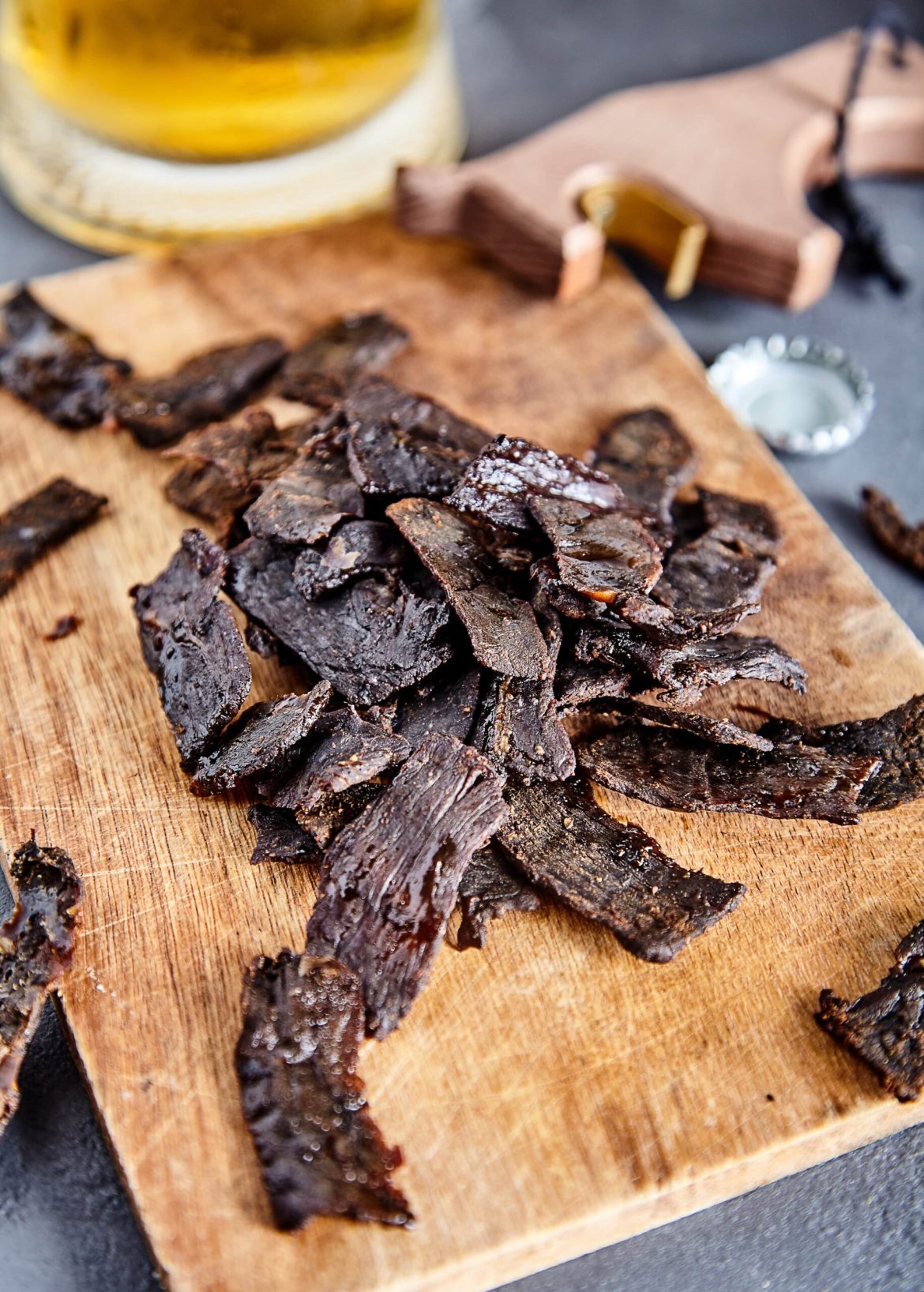We all know that jerky is a popular and convenient snack that we can carry around with us in our busy schedules to fulfill our protein requirements. But are you sure that they are healthy?! What are the nutritional benefits of jerky, and how much is good for our health? Continue to read this blog to learn about the history, health benefits of jerky, and its potential downsides, if there are any.
What is Jerky?
According to USDA, “Jerky is nutrient-rich beef meat that has been dried to make it lighter. After being converted into jerky, a pound of beef or chicken weighs around 4 ounces. Because the majority of the moisture has been removed, it is shelf-stable and can be stored without refrigeration, making it an ideal food for trekkers and anyone without access to refrigerators.”
Jerky is manufactured from both domesticated and wild animals. Domesticated animal jerky includes beef, goat, pork, mutton or lamb, and game animals such as kangaroos, kudu, deer, springbok, and bison.
History of Jerky
Meat is the earliest food to be dried, and drying is the oldest method of food preservation.
The earliest ways to dry meat were by using the sun and wind. One of the first types of smokehouses was a tepee. Native Americans dried buffalo meat strips by hanging them over campfires. The dried meat was then placed for preservation in skin bags called parfleches. The Quechua, an ancient Inca tribe, are believed to have invented cha’arki, or jerky, in South America around 500 years ago.
The art of jerky-making was brought to North America by Native Americans when European immigrants arrived in the early 1800s.
The American Industrial Revolution (1868–1970) saw the enormous production of jerky for human consumption. To create new variants, some of the excessive salt content in various forms of jerky was substituted with sugar. The inclusion of chili and pepper kept many pests away from the jerky, which is why many jerky recipes include a lot of chili!
Today, millions of people all around the world love eating jerky. The process remains the same, but the salted and seasoned meat strips are now dried in dehydrators and ovens.
Nutritional Information of Jerky
Let us explore the nutritional benefits of beef jerky and chicken jerky in this article.
Nutritional information of beef jerky:
Because it contains all of the necessary amino acids that our bodies require, beef jerky is a great source of high-BV (biological value) protein. and little carbohydrate-containing. It is therefore included in many diets, including low-carb and keto, and has a higher nutritional profile than many other snack items.
The following nutrients are found in around 100 grams of beef jerky per serving, as per the information provided in USDA:
- 410 kcal of calories
- 11 g of carbohydrates
- 33.2 g protein and 25.6 g fat.
- 51 mg of magnesium
- 597 milligrams of potassium
- 5.42 milligrams of iron
- Fiber: 1.8 g
- 20 mg of calcium
- 407 mg of phosphorus
- 1780 mg of sodium
- 8.11 milligrams of zinc

Nutritional information of chicken jerky:
Lean chicken meat is used to make the tasty and high-protein snack known as chicken jerky. It contains a lot of protein and the essential amino acids needed for muscle development and repair. Chicken jerky is a great choice for people who want to manage their weight because it is minimal in calories and fat.
The following nutrients are found in around 100 grams of chicken jerky per serving, as per the information provided in USDA:
- 286 kcal of energy
- 35.71 grams of protein
- 32.14 grams of carbs
- Fat: 0 grams
- Fiber: 0 grams
- Calcium: 0 milligrams
- 25 g of total sugars
- 1500 mg of sodium
- Iron: 0 mg
- 107 mg of cholesterol
What are the health benefits of jerky?
Health benefits of jerky:
- Rich in protein:
Protein is a macronutrient that promotes strong bones, muscles, and skin as well as aids in cell creation and repair. Eating protein every day is vital because, unlike carbohydrates and fats, your body does not store proteins.
Beef jerky, or chicken jerky, is a rich source of protein. It can help with muscle growth and repair.
- Contains less fat and carbohydrates:
Most of the fat content of the meat is removed in the process of dehydration. So jerky is low in carbohydrates and fat content. This makes beef jerky or chicken jerky a suitable option for low-carb diets like keto and paleo.
The high protein content of the beef jerky will also help you stay full for a long time and may aid in your weight loss.
- Rich in vitamins and minerals:
Beef jerky contains minerals like zinc and iron. These minerals play an important function in the body, like boosting the energy levels and immunity of your body.
- Portability and shelf life:
One of the biggest advantages that comes with jerky is the convenience of carrying it to outdoor activities or the gym like any other snack.
It helps you meet the protein requirements of your body when you’re not able to cook a full-pledged home-cooked meal.
Beef jerky doesn’t require refrigeration, as it is made by curing and marinating it with spices and sauces. The salt works as a natural preservative and helps improve its shelf life.
- Helps improve bone health:
Beef jerky is rich in phosphorus, which is vital for maintaining healthy bones and teeth. It works in conjunction with calcium to build and maintain strong bones and teeth.
How healthy is a jerky?
As we have seen, jerky is high in protein and low in carbs and fats. But it contains high amounts of sodium which isn’t great for your health. So consider natural options and have it in moderation.
Max Jerky brings you artisan-quality, handcrafted jerky with global flavors.
MaxJerky Texas Barbecue Beef Jerky, 27.5 Grams of Protein, 2.5 OZ (4 Pack)

Was so good. I will for sure be ordering more
Amazon Customer
MaxJerky Sichuan Chili Crisp Chicken Jerky, 27.5 Grams of Protein, 2.5 OZ (4 Pack)

Pretty good. Not tough on the jaw. Nice strong consistent flavor
Amazon Customer
MaxJerky New York Buffalo Chicken Jerky, 22.5 Grams of Protein, 2.5 OZ (4 Pack)

Amazon Customer
MaxJerky Montreal Maple Bacon Burnt Ends, Smoked Bacon Jerky, 2.5 OZ (4 Pack)

We love the mouthwatering Maple Bacon Burnt Ends!
Amazon Customer
Is beef jerky good for your immune system?
One of the benefits of eating beef jerky is its zinc and iron content. Beef jerky contains 5.42 milligrams of iron and 8.11 milligrams of zinc per 100 gm, as per the information provided by the USDA. Both zinc and iron help maintain the immune system in your body.
Is beef jerky good for muscle growth?
Beef jerky contains 33.2 g of protein per 100 g. Due to its high protein content, beef jerky helps build your muscles.
Final Verdict:
Even though it’s a healthy snack, beef jerky should only be eaten in moderation. An ounce of beef jerky provides around 22% of your daily sodium requirement. This makes it high in sodium.
Consuming too much salt can negatively impact your blood pressure, heart health, and risk of stroke, among other elements of your health. To sum up, even though beef jerky is a nutritious snack, it should only be eaten rarely. Whole, unprocessed foods should make up the majority of your diet.
Sources:
https://ask.usda.gov/s/article/What-is-jerky
https://fdc.nal.usda.gov/fdc-app.html#/food-details/1657955/nutrients
https://en.wikipedia.org/wiki/Jerky
http://www.foodpreserving.org/2014/11/history-of-jerky.html
https://fdc.nal.usda.gov/fdc-app.html#/food-details/167536/nutrients


